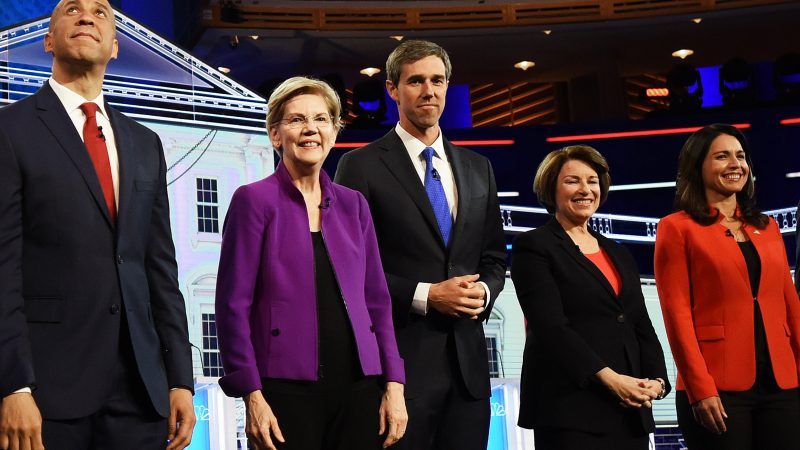Democrats Are Terrified of Their Own Non-Socialism
Those who disagree with Elizabeth Warren's economics tried really hard not to say so during the Dems' first presidential debate

Yesterday, before the first Democratic presidential debate of the 2020 cycle, I argued that early debates can actually tell us a lot about where a political party is heading, and that the biggest question Wednesday would be "Will any non-fringe candidate bring up math?"
Last night's answer came through loud and clear: Oh, hell no.
Literally, the second, third, and fourth questions, asked to the second-, third-, and fourth-highest-polling candidates on stage were invitations to refute the budgetary math and government-energizing approach of the evening's front-runner, Sen. Elizabeth Warren (D–Mass). And all three competitors whiffed.
Sen. Amy Klobuchar (D–Minn.), who has made clear in this campaign that she's not a "democratic socialist," was asked to expand on her dismissal of progressive "magic genie" proposals to hand out free money to the likes of college students, but spent just one short, defensive sentence in her 190-word response acknowledging any limitations on giveaways. "So I do get concerned about paying for college for rich kids, I do," Klobuchar said. "But I think my plan is a good one. And my plan would be to, first of all, make community college free and make sure that everyone else besides that top percentile gets help with their education."
Former congressman Beto O'Rourke, who has campaigned in the past on cutting the size of government, was asked whether he would agree to a 70 percent top marginal income tax rate, which has been proposed by Rep. Alexandria Ocasio-Cortez (D–N.Y.), and bears a passing resemblance to Warren's tippy-top tax. O'Rourke, visibly nervous, literally did not answer the question despite three attempts by moderator Lester Holt, beginning his first filibuster with this perfectly Warrenesque rhetoric:
"Right now, we have a system that favors those who can pay for access and outcomes. That's how you explain an economy that is rigged to corporations and to the very wealthiest. A $2 trillion tax cut that favored corporations while they were sitting on record piles of cash and the very wealthiest in this country at a time of historic wealth inequality."
As I wrote yesterday, "Whether Klobuchar or O'Rourke feel brave enough to stand up for budget math will be a key early indicator of whether bothering to pay for stuff is still a live rhetorical issue in the Democratic Party." They failed the test spectacularly. And they were hardly alone.
Sen. Cory Booker (D–N.J.), who has been running away from his past enthusiasm for charter schools, took a different tack than evasion or acknowledgment—he simply denied there was any daylight between him and Warren at all.
"You've said we should not 'be running around pointing at companies and breaking them up without any kind of process'," NBC's Savanna Guthrie pointed out. "Why do you disagree?" Booker simply replied, "I don't think I disagree," then went on to bemoan corporate consolidation and criticize companies by name.
As foreshadowed, the only candidate on stage last night to seize the notion of practicability as a differentiator and selling proposition was moneybags former Maryland congressman John Delaney, currently averaging 0.4 percent in national polls. But even Delaney, who injected some comparatively centrist notions into discussions on Medicare and climate change, and whose closing statement emphasized "real solutions" over "impossible promises," turned down a golden opportunity to swat away the statist claptrap of New York Mayor Bill de Blasio.
After the deservedly loathed mayor posited that the "heart and soul" of the Democratic Party should include such notions as "there's plenty of money in this world, there's plenty of money in this country; it's just in the wrong hands," Delaney was asked directly by Telemundo host José Díaz-Balart "Do you agree?"
Delaney's 229-word answer didn't come close to including the word "no."
"I think we have to do real things to help American workers and the American people, right?" he said. "This is the issue that all of us hear on the campaign trail. We need to make sure everyone has a living wage. And I've called for a doubling of the earned income tax credit, raising the minimum wage, and creating paid family leave." And so on.
Democratic candidates on stage last night did not see their own different-than-Warren economic policy views as potential slingshots to vault their campaigns forward, but rather more like icebergs that could sink the whole enterprise. Klobuchar spent a single sentence defending the apparently controversial-to-Democrats notion that maybe outlawing private health insurance wasn't such a hot idea, then pivoted quickly to evil pharmaceutical companies. O'Rourke couched his own Klobuchar-like reticence in the most lefty sounding way: "If you're a member of a union that negotiated for a health care plan that you like because it works for you and your family, you're able to keep it," he said.
As Nick Gillespie noted this morning, tonight's grown-ups' table debate (featuring 10 candidates with a combined two-thirds of national polling support), will give us the best early opportunity to test democratic socialism with whatever isms front-runner Joe Biden and out-of-nowhere upstart Pete Buttigieg represent. Soon enough, we won't have the John Delaneys of the world to kick around anymore; will any other Democrat be brave enough to buck the party's embrace of magic-genie economics?


Show Comments (29)